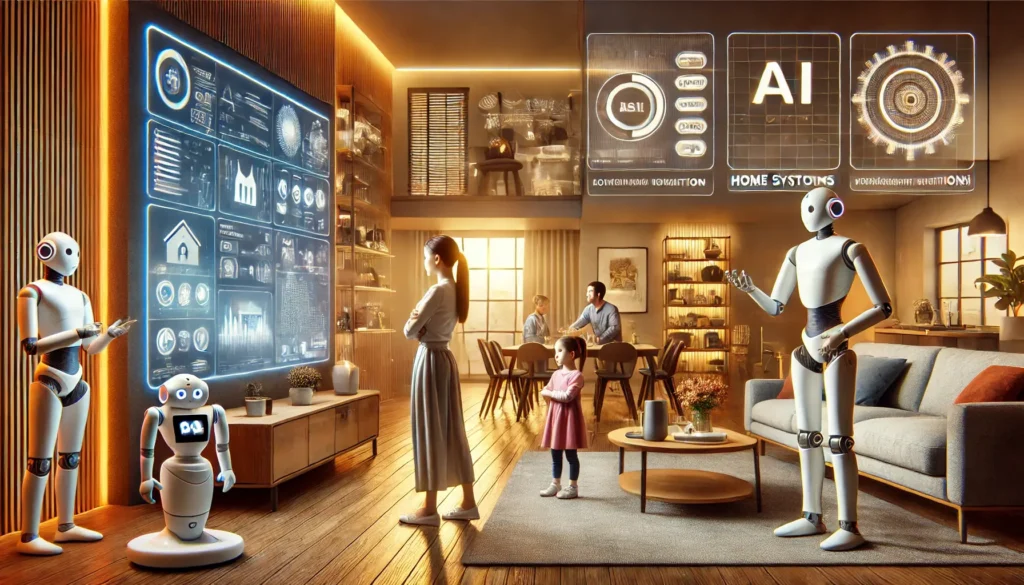Artificial Intelligence (AI) and automation are reshaping the way we live and work, transforming everything from how we interact with technology to how tasks are performed in various industries. As these innovations advance rapidly, their influence is becoming increasingly pervasive in daily life, affecting everything from home devices to large-scale manufacturing processes. Understanding the growing role of AI and automation is essential for staying informed about the future of work, leisure, and personal productivity. This article delves into how these technologies are integrated into everyday activities and why it’s important to grasp their impact.

The Rise of AI and Automation in Everyday Life
What is AI and automation?
AI refers to machines or software designed to perform tasks that typically require human intelligence, such as learning, problem-solving, or decision-making. It enables systems to analyze data, recognize patterns, and improve over time without explicit programming. On the other hand, automation involves the use of technology to perform tasks automatically with minimal human intervention. It can be found in everything from factory robots to software that handles repetitive administrative tasks.
Key differences between AI and automation
While both AI and automation streamline processes, their functions differ significantly. Automation is focused on completing predefined tasks, like assembly line work or data entry, while AI involves systems that can adapt, learn, and make decisions based on data. Automation typically requires little to no adaptability, whereas AI systems are designed to evolve and improve over time, becoming smarter and more efficient with experience.
Growing integration into daily activities
The integration of AI and automation into daily life is expanding rapidly. AI-powered virtual assistants like Siri and Alexa help manage household chores, while autonomous vehicles and drones are changing the way we commute and deliver goods. In industries like healthcare, automation and AI are revolutionizing diagnostics and treatment planning. As these technologies evolve, their influence will only continue to grow, making it crucial to understand their potential impact on society.
AI and Automation in Smart Homes
Voice assistants: Alexa, Google Assistant, Siri
The integration of AI and automation into smart homes is revolutionizing the way we live, making our homes more efficient, secure, and convenient. Voice assistants such as Amazon’s Alexa, Google Assistant, and Apple’s Siri serve as the central control hubs, allowing users to interact with their homes through voice commands. These voice-activated assistants can manage everything from adjusting the thermostat and controlling lights to setting reminders and playing music, making daily tasks seamless.
Smart appliances and home security systems
In addition to voice assistants, smart appliances and home security systems are a major component of the smart home ecosystem. Refrigerators, washing machines, ovens, and even coffee makers are becoming smarter, enabling users to control them remotely or set schedules for operation. Security systems equipped with AI-powered cameras, motion sensors, and alarms can enhance home safety by detecting unusual activity and alerting homeowners in real-time.
Benefits: convenience, energy savings, security
The benefits of AI and automation in smart homes are numerous. They provide unmatched convenience, allowing homeowners to manage their environment with minimal effort. Energy savings are another significant advantage, as smart thermostats and lighting systems can automatically adjust to optimize energy usage. Moreover, the enhanced security features contribute to peace of mind, ensuring that homes are well-protected from potential threats.
Transforming Transportation with AI and Automation
AI and automation are also making waves in the transportation sector, particularly with self-driving cars and autonomous vehicles. These vehicles, powered by advanced AI algorithms and sensors, have the potential to reduce human error, decrease traffic accidents, and offer a more efficient driving experience. By eliminating the need for a human driver, autonomous vehicles could also make travel more accessible to people who are unable to drive due to age or disability.
In addition to autonomous vehicles, AI-driven traffic management systems are improving the flow of traffic and reducing congestion. By analyzing real-time data from cameras and sensors, these systems can adjust traffic signals and routing to optimize traffic movement, minimize delays, and reduce fuel consumption.
The future of public transport and mobility is also being shaped by AI and automation. Autonomous buses, trains, and even flying vehicles could revolutionize how people commute, offering more efficient and sustainable alternatives to traditional transportation methods. These advancements promise a future where transportation is safer, faster, and more accessible for everyone.
AI and Automation in the Workplace
AI and automation are transforming workplaces by handling repetitive tasks, allowing employees to focus on more creative and strategic activities. One of the most common applications is automating routine administrative tasks, such as email management and scheduling. Tools powered by AI can filter emails, prioritize them, and schedule meetings based on availability, saving time and reducing human error.
AI-powered customer service is also on the rise, with chatbots and virtual assistants providing instant, 24/7 support. These tools can handle a wide range of inquiries, from answering frequently asked questions to providing product recommendations, making them invaluable for enhancing customer satisfaction and reducing the workload on human agents.
The benefits of automation extend to overall workplace productivity and job efficiency. By automating repetitive and time-consuming tasks, businesses can increase output, reduce operational costs, and enhance employee satisfaction. Employees can focus on higher-level functions, such as decision-making and innovation, improving overall business performance.
AI in Healthcare: Revolutionizing Daily Care
AI is revolutionizing healthcare, improving patient outcomes, and streamlining healthcare operations. Wearable tech and health monitoring devices have become commonplace, allowing patients to track vital signs like heart rate, glucose levels, and sleep patterns in real time. These devices can alert both patients and healthcare providers to potential issues, enabling early intervention and more personalized care.
In diagnostics, AI is playing a pivotal role in analyzing medical data to assist doctors in diagnosing conditions faster and more accurately. For example, AI algorithms can analyze medical imaging, such as X-rays and MRIs, detecting early signs of diseases like cancer or heart conditions that may be overlooked by human eyes. AI is also assisting in treatment recommendations, providing doctors with evidence-based options tailored to the individual patient’s needs.
Automation is also enhancing healthcare operations. AI systems help streamline administrative tasks like appointment scheduling, billing, and patient record management, improving operational efficiency and freeing up resources for patient care. As a result, AI is transforming both the clinical and operational aspects of healthcare, offering more effective and efficient care to patients.
The Role of AI in Personal Finance
AI-powered budgeting and financial planning apps
AI has revolutionized personal finance management by introducing advanced budgeting and financial planning tools. These apps use AI to analyze users’ spending habits, track income, and categorize expenses automatically. By offering real-time insights and personalized recommendations, they help individuals stay on track with their financial goals. AI can predict future expenses and advise on saving strategies, making budgeting more efficient and tailored to users’ unique financial situations.
Automation in investing: Robo-advisors and trading bots
One of the most significant advancements in personal finance is the rise of robo-advisors and trading bots. These AI-powered tools analyze vast amounts of market data and assist investors in making informed decisions. Robo-advisors create personalized investment portfolios based on a user’s risk tolerance, financial goals, and preferences, while trading bots automate buying and selling, optimizing trades based on real-time market conditions. By reducing the need for manual interventions, these tools make investing more accessible, efficient, and affordable.
Enhancing personal finance management through AI
AI enhances overall personal finance management by providing users with actionable insights into their financial health. Through machine learning algorithms, AI can identify trends, highlight potential savings opportunities, and even detect fraud. Additionally, AI-driven financial advisors offer 24/7 support, providing personalized advice and ensuring users are making informed financial decisions. With continuous advancements in AI technology, managing personal finances has become more streamlined, helping individuals achieve greater financial control and security.
The Pros and Cons of AI and Automation in Daily Life
Benefits:
AI and automation have significantly improved daily life by enhancing efficiency, convenience, and safety. Tasks that once took hours can now be completed in seconds with the help of AI-driven tools, from managing personal schedules to optimizing energy consumption in homes. Automated systems in vehicles, homes, and workplaces also contribute to safety by reducing human error and preventing accidents. For example, autonomous driving technology can reduce traffic collisions caused by fatigue or distraction, while AI-powered home security systems can offer real-time monitoring and alerts.
Challenges:
However, the rise of AI and automation brings along several challenges. Privacy concerns are top of mind, as personal data is often collected, stored, and analyzed to make AI systems smarter. There are also worries about job displacement, as machines take over repetitive tasks previously done by humans, leading to a potential shift in the workforce. Security risks are another concern, as AI systems can be vulnerable to hacking, and automated systems could be exploited for malicious purposes.
Balancing innovation with ethical considerations is crucial to ensuring that the benefits of AI and automation are realized without compromising societal values. We need to address these issues thoughtfully to ensure equitable and responsible use of these technologies.
How to Embrace AI and Automation Responsibly
Understanding privacy settings and data protection measures is essential when using AI-powered devices. Be aware of what data is being collected and take steps to control it. Staying updated on AI advancements helps ensure that users can make informed decisions about the technologies they adopt. It’s also important to approach new technologies with an open mind, adapting to changes while considering the long-term implications on privacy, employment, and security. Embracing AI responsibly means using it to enhance life while addressing potential risks.
Conclusion
The Future of AI and Automation in Our Lives
As AI and automation continue to advance, they are transforming our daily lives in profound ways. Rather than being seen as separate entities, these technologies are increasingly becoming partners in enhancing our daily routines. From smart homes that anticipate our needs to AI-powered tools that optimize our work processes, these innovations are seamlessly integrating into various aspects of life. They’re not just changing how we do things—they’re helping us do them better, faster, and more efficiently.
The evolving role of technology is also key in unlocking human potential. Automation takes over repetitive, time-consuming tasks, allowing us to focus on higher-value activities, whether that’s fostering creativity, solving complex problems, or building meaningful relationships. AI is becoming a trusted ally in industries ranging from healthcare to education, offering data-driven insights and improving decision-making. As these technologies evolve, they create opportunities for innovation and growth that were once unimaginable.
Preparing for the future means embracing these advancements with confidence. While change can be intimidating, the integration of AI and automation offers tremendous potential for societal progress. By cultivating a mindset of adaptability, continuous learning, and collaboration with technology, we can ensure that we are ready to thrive in a future where humans and machines work hand in hand. The key lies in not just accepting change, but in actively shaping it, ensuring that AI and automation enhance the human experience rather than replace it. In doing so, we prepare ourselves for a future full of possibilities and endless opportunities.
FAQs
- How is AI transforming daily life?
AI impacts various aspects, from transportation to healthcare, improving convenience and efficiency. - Are AI and automation replacing jobs?
While some jobs are being automated, new opportunities are also created as technology evolves. - How does automation improve home security?
Automation enhances security through smart cameras, alarms, and motion sensors, allowing remote monitoring and real-time alerts. - Can AI help with personal finance?
AI-powered apps assist in budgeting, financial planning, and even investment management, offering personalized recommendations. - What are the ethical concerns about AI and automation?
Ethical concerns include data privacy, job loss, and ensuring AI decision-making aligns with human values. - How does AI and automation affect daily productivity?
AI and automation streamline tasks, reduce manual effort, and enhance efficiency, allowing individuals to focus on more complex and creative aspects of their work. - How does AI improve healthcare?
AI enhances healthcare by assisting in diagnostics, predicting patient outcomes, and personalizing treatment plans, leading to faster, more accurate care.


